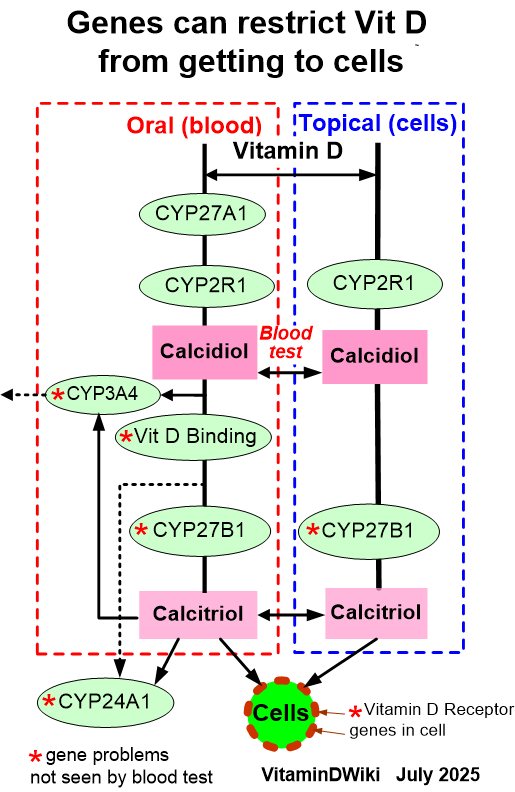Vitamin D and Multiple Sclerosis, Alzheimer's, Parkinson's ,Dementia, and ALS - review
Vitamin D and Neurological Diseases: An Endocrine View
Int. J. Mol. Sci. 2017, 18, 2482; doi:10.3390/ijms18112482
Carolina Di Somma , Elisabetta Scarano , Luigi Barrea , Volha V. Zhukouskaya 2,
Silvia Savastano 2, Chiara Mele<1,5, Massimo Scacchi4,6 , Gianluca Aimaretti ,
Annamaria Colao 2 and Paolo Marzullo paolo.marzullo@med.uniupo.it
 * Multiple Sclerosis, Alzheimer’s and Parkinson’s need more than 30 ng of Vitamin D – review Nov 2017
* ALS fought by vitamin D - many studies
* Overview Parkinson's and Vitamin D
* Overview MS and vitamin D
* Alzheimer’s, Parkenson’s, and Multiple Sclerosis – vitamin D may prevent and treat – Oct 2017
1. Overview Alzheimer's-Cognition and Vitamin D has the following summary
{include}
1. Dementia
* Dementia risk factor is increased by 1.5 if low vitamin D – meta-analysis Jan 2017
* Dementia less likely with increased levels of Magnesium etc.
* Dementia 19X more likely if low vitamin D – Jan 2012
* Dementia 13X more likely in elderly with low vitamin D – May 2014
* Dementia risk significantly increased if have 4 chronic diseases – all associated with low vitamin D – Sept 2015
* Search VitaminDWiki for dementia anywhere in text 960 items Nov 2017
1. Endocrine and Genes
* Autocrine, Paracrine and Endocrine - simple chart
*
* Multiple Sclerosis, Alzheimer’s and Parkinson’s need more than 30 ng of Vitamin D – review Nov 2017
* ALS fought by vitamin D - many studies
* Overview Parkinson's and Vitamin D
* Overview MS and vitamin D
* Alzheimer’s, Parkenson’s, and Multiple Sclerosis – vitamin D may prevent and treat – Oct 2017
1. Overview Alzheimer's-Cognition and Vitamin D has the following summary
{include}
1. Dementia
* Dementia risk factor is increased by 1.5 if low vitamin D – meta-analysis Jan 2017
* Dementia less likely with increased levels of Magnesium etc.
* Dementia 19X more likely if low vitamin D – Jan 2012
* Dementia 13X more likely in elderly with low vitamin D – May 2014
* Dementia risk significantly increased if have 4 chronic diseases – all associated with low vitamin D – Sept 2015
* Search VitaminDWiki for dementia anywhere in text 960 items Nov 2017
1. Endocrine and Genes
* Autocrine, Paracrine and Endocrine - simple chart
*  * Brain cells can probably activate Vitamin D without liver or kidney (at least in rats) – Sept 2017
Vitamin D blood test misses a lot
* Brain cells can probably activate Vitamin D without liver or kidney (at least in rats) – Sept 2017
Vitamin D blood test misses a lot

📄 Download the PDF from VitaminDWiki

Abstract: Vitamin D system comprises hormone precursors, active metabolites, carriers, enzymes, and receptors involved in genomic and non-genomic effects. In addition to classical bone-related effects, this system has also been shown to activate multiple molecular mediators and elicit many physiological functions. In vitro and in vivo studies have, in fact, increasingly focused on the "non-calcemic" actions of vitamin D, which are associated with the maintenance of glucose homeostasis, cardiovascular morbidity, autoimmunity, inflammation, and cancer. In parallel, growing evidence has recognized that a multimodal association links vitamin D system to brain development, functions and diseases. With vitamin D deficiency reaching epidemic proportions worldwide, there is now concern that optimal levels of vitamin D in the bloodstream are also necessary to preserve the neurological development and protect the adult brain. The aim of this review is to highlight the relationship between vitamin D and neurological diseases.
